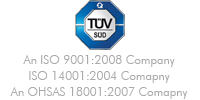Company Profile
Veteran manufacturers & suppliers of all kind of Heat Exchangers. Targeted market - Private and Public sector. Procurement of raw materials after dual quality testing. Highly Qualified and experienced workforce. Production capacity of more than 1500M.T. (per annum) Total covered area more than 3 acres. Crane facility of 70 M.T. + 20 M.T. And 40M.T. + 20 M.T is available in workshop. Complete array of products and services delivered.
Quality Assurance -Regular Third party surveillance check (Third Party IBR, M/s Lloyds, M/s Det Norske Vertias (DNV), TCE Consultant Engineers Ltd., QUEST, EIL, CEIL, IRS, Superintendent Company of India & SGS). Tailor made products designed to satisfy customer needs. Three spacious and well organized workshops capable of constitutive independent production. Well equipped modern and automatically driven machinery and associated instruments.
Vision & Mission
The foundation of the strong organization are :
- Developing a clear and compelling purpose
- Identifying the organization's mission to achieve the purpose
- Agreeing on a set of values by which to carry out the mission
- Adopting a servant leader attitude throughout the organization.
An organization's Purpose is the "WHY?" of its existence. It's not what it does as much as what it is striving to accomplish. It is a statement of the greater good it is attempting to achieve. It answers the question: "Why are we here?" and helps give clarity and focus to each person in the organization. It is the yardstick by which decisions are measured.
 An organization's Mission is the "WHAT" of an organization. It is a definition of what the company does to achieve its stated Purpose. It begins to define the core proficiencies of a business and helps keep it focused on achieving its Purpose.
An organization's Mission is the "WHAT" of an organization. It is a definition of what the company does to achieve its stated Purpose. It begins to define the core proficiencies of a business and helps keep it focused on achieving its Purpose.
An organization's set of Values is the "HOW" of an organization. It defines what an organization most values in the execution of its Mission. It's not an all encompassing list of possible values as much as a statement of what the organization most values in its people and their conduct. It defines behaviours and culture within an organization. It helps set the guidelines of what is and is not acceptable.
At the core of Servant Leadership is the premise that the customer is the most important person to the organization. As a consequence of that premise, it only follows that the most important people to the customer are the frontline staff. They're the people who customers interact with on a daily basis. This understanding leads to the philosophy that the job of the manager of the frontline people is to make their jobs as easy and effective as possible so the customer has the best experience possible. The result is an organizational chart that looks like an inverted pyramid.
This servant attitude focuses leaders on developing those around them. It leads to people working together in a collaborative, solution-oriented environment. It also requires each leader to be Authentic, Vulnerable, Accepting, Present, and Useful.

